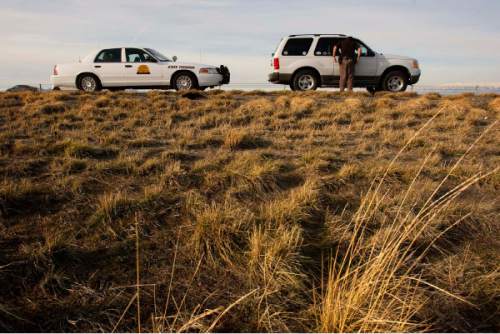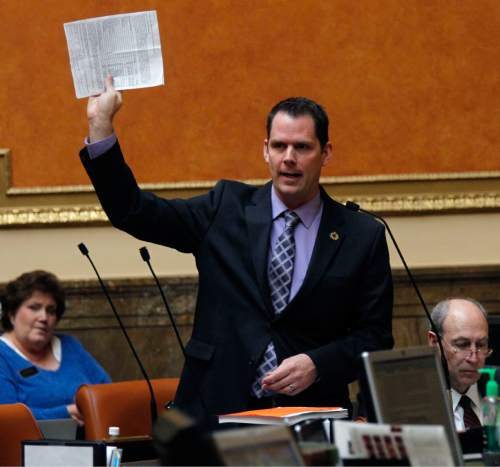This is an archived article that was published on sltrib.com in 2015, and information in the article may be outdated. It is provided only for personal research purposes and may not be reprinted.
State Rep. Jake Anderegg, R-Lehi, says he was driving in a 50-mph speed zone — and admittedly doing about 65 — when he first spotted the American Fork Police officer pointing a radar gun at him on the Pioneer Crossing highway.
Anderegg says he did what he always does in that situation: "I slammed on the brakes." So by the time he came to a reduced 35-mph-speed -zone sign ahead, he figures, "I was at best doing 35-40."
But he was ticketed for traveling 71 in that 35-mph zone.
The lawmaker says the citation "irks" him, and he asserts that the officer recorded his speed in the faster speed zone, and claimed it occurred in the slower one — as part of a speed-trap ploy to boost city revenue. Anderegg lost his challenge in court, and paid a steep $380 fine.
After hearing from others who say similar tactics being used around the state, Anderegg has opened a bill file to work on legislation seeking to stop such possible subterfuge.
He is considering requiring officers who issue tickets near speed-zone changes to show details on tickets, such as how far their devices say they were from the allegedly speeding car, and the officer's distance from the speed-zone-change sign.
Anderegg believes such information would at least provide some hard evidence about whether speeding actually occurred in the slower speed-limit area. Now, he says, "It is entirely law enforcement's word against the civilian's word, and the judge is going to support the officer."
Anderegg said, "We'd like to think that all police officers are honorable people…. But I happen to know some are not."
He said he is also considering a prohibition on cities and counties using speeding-ticket revenue in their general funds to "remove the incentive of some of these small cities to try to generate revenue for their city based on speed traps."
But Anderegg stresses, "I don't know exactly if I am going to run this bill or not" because he still has plenty of work to do on the issue.
One problem is that some radar guns do not record distances between officers and the cars whose speed they measure.
Utah Highway Patrol Lt. Alex Letley said that "lidar" guns, which use optic laser beams to determine speeds, also record such distances. But sound-using radar guns do not.
Anderegg expects that agencies using radar guns would likely fight a change that would require them to purchase new equipment, so "we'll just have to work through that, and see."
In his case, he said he saw the officer clearly. "He wasn't hiding behind something. I slowed down," and Anderegg says he knows he was not speeding much by the time he entered the slower speed zone. "But I couldn't prove it."
After a TV news story about his court fight against the ticket, Anderegg says he had numerous calls and emails from people around the state saying the same thing had happened to them. So he believes it "is fairly rampant around the state" as a way to boost local revenue.
He noted he received his ticket right at the American Fork boundary, and, "I've been around long enough to know that American Fork is struggling financially. They are really having a hard time meeting their budgets right now."
ldavidson@sltrib.com Twitter: @LeeHDavidson





